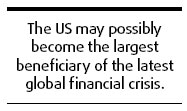Zhang Monan
A global economy that goes beyond the dollar
Updated: 2009-04-20 07:45
By Zhang Monan (China Daily)
The G20 Summit has left behind a raft of unresolved problems amid worldwide efforts to cure the sickened global economy. The London meeting of the heads of the world's 20 leading economies early this month failed to prescribe an immediate panacea to haul the world's ailing economy out of a recession.
Despite some noteworthy achievements, the meeting was still far from working out a feasible formula to curb the unchecked issuance of the dollar, the cause of the ongoing global financial crisis. This will not only let slip the best chance for the world to tackle the crisis, it will also worsen the global economy.
Any misjudgment of the once-in-a-century financial crisis, such as ways to leverage or create liquidity excess to spur economic recovery, will possibly add to the current economic predicament.
It is known that the United States has long been adept at employing an egoistic financial policy to serve its economy. The US Federal Reserve recently adopted a quantitative easing of monetary policy to buffer the impact of the global financial crisis. Excessively issuing the dollar and raising national debt has long served as two major engines of US economic growth. As the world's largest debtor, the US now views the inflation and devaluation of the dollar as a secret weapon to curtail its mammoth foreign debt. Also, the dollar's status as the global reserve currency has easily enabled the world's largest economy to shift part of the price it should shoulder for inflation to other countries.
Experience indicates that the US usually capitalizes on the devaluation of the dollar to eradicate part of its huge foreign debt. A depreciating dollar has in fact helped the US move in this direction in recent years. The dollar's devaluation in the past six years has caused the dollar-denominated assets by other countries to dwindle drastically. Due to dollar devaluation, a total of $3.58 trillion evaporated from 2002 to 2004.
By the end of last year, the total national debt owed by the US government, its social security system, enterprises, individuals and non-profit organizations, was eight times of the country's GDP. With the launch of large-scale economy aid, the US fiscal deficit this year is likely to reach $1.186 trillion, or 8.3 percent of its GDP. Next year's budgetary deficit is expected to hit as high as $1.75 trillion, about 12 percent of its GDP.

By adopting a quantitative easing of monetary policy, the Federal Reserve's real intention is to expand the balance sheet of the monetary authority in an effort to offset part of its foreign debt. Thus, the US does not worry about inflation in the future. On the contrary, it may possibly become the largest beneficiary of the latest global financial crisis through a series of monetary and financial policies. Such a move is likely to shift financial and economic risks to its creditors and some emerging economies, before pushing them to the front of sustaining inflation and disorderly devaluation of their local currencies. Japan has embraced the same monetary policy over the past decade, inflicting huge damage on some developing countries.
It is known that after Japan's adoption of such a relaxed monetary policy in the 1990s, a large volume of its yen spread to the world, at a more than 15 percent leakage rate. As the world's dominant currency, the dollar's leakage rate would be higher than the yen's if a quantitative easing of monetary policy is adopted. The policy is expected to result in an outflow of the dollar across the world, inevitably causing severe impact on other financial markets and monetary systems.
Judging from past financial crises, a fluidity excess is not good enough to rescue a global economic crisis. On the contrary, it will possibly obstruct economic recovery, as proven by the Great Depression in the 1930s. During that global economic slump, the Federal Reserve employed a relaxed monetary policy to contain deflation. The Fed increased the issuance of a monetary base on the one hand, lowering federal interest rates on the other. However, the 20 percent increase of the monetary base from 1929-33 resulted in an inflation of up to 10 percent in 1934.
Currently, a continuous increase of a global monetary base is now brewing a new round of vicious inflation. A large rebound being experienced in the price of gold, the CRB index as well as stock markets in the US and some emerging economies has signaled a new round of inflation emerging. In particular, the adoption of fiscal deficit by a number of countries, their relaxing of credit and creation of a huge liquidity - believed to protect local trade, promote monetary security and resist deflation - will inevitably spark larger-scale inflation across the world.
The global economy will not move out of a prolonged turbulence and imbalance if it remains linked to the dollar. A stable and self-initiated financial policy in China will also play an irreplaceable part in helping to stabilize the world's financial system.
The country should try to use its yuan to coordinate regional economic development, as well as set up closer economic zones and cooperation with Asian countries. The establishment of a full-fledged regional financial market supported by the alliance of local currencies will contribute to the coordinated development of the world's economy.
The writer is an economics researcher with the State Information Center.
(China Daily 04/20/2009 page4)
Specials

President Hu visits the US
President Hu Jintao is on a state visit to the US from Jan 18 to 21.

Ancient life
The discovery of the fossile of a female pterosaur nicknamed as Mrs T and her un-laid egg are shedding new light on ancient mysteries.

Economic figures
China's GDP growth jumped 10.3 percent year-on-year in 2010, boosted by a faster-than-expected 9.8 percent expansion in the fourth quarter.